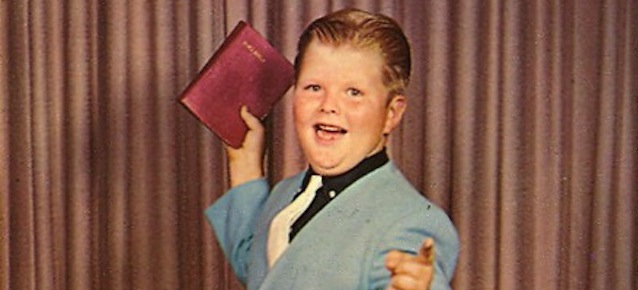
Bravo to The NY Times for including Mark Galli’s wonderful and irenic “Focus on Grace, Not Control” in their new Room for Debate on the question “With Children, When Does Religion Go Too Far?” It’s a clear, brief and even exciting reminder of what Christianity has to offer to men and women–children and parents–who are living under the burden of control, whether it be in its religious or non-religious form, namely, the exact opposite of what most people perceive/experience it as offering (for good reason, as the comments depressingly bear out). It’s a little ironic that Galli–whose byline might suggest to some an “us vs. them” mentality–seems to be alone among his fellow commentators in not locating the problem “out there”. At least not exclusively:
Legalism and authoritarianism are temptations in conservative Christianity, and strict obedience of children to their parents is one cardinal rule. Some biblical verses wisely point in this direction (for children certainly do need to be obedient in some situations: “Stay away from that stove” and “Hold my hand as we cross the street” come to mind). But this biblical injunction is a source of confusion for some Christian parents, some of whom fear that their children might reject the faith or turn out “worldly.” Because of this, many parents, yearning for a sense of control, have a sincere desire to obey scripture as they understand it. Of course, some are simply control freaks.
It would be easy to say this is a distortion of “real religion.” But the fact that children are often oppressed in religious households suggests that there is indeed something in religion which tempts parents in this way. That temptation is the inherent human fascination with law and control. People become religious for many reasons, good and bad. One for many is that their lives are completely out of control morally and socially, and they see in religion a way to bring order to the chaos. Religion as inner police. Such adherents are attracted to religions, or denominations within religions, that accent discipline and obedience. This happens — surprisingly — even in Christianity.
This is surprising because the New Testament message is about freedom from law, and being grounded in grace. “For freedom Christ has set us free,” proclaimed Paul in his most profound exposition of grace. The fact that even some Christians fail to grasp the radical nature of God’s unconditional love suggests just how deeply we humans are embedded in a world ruled by law, expectations, duty, control and obedience. We naturally imagine that Christianity is just a nicer form of this basic reality. The message of grace is so radical that it is simply hard to hear it for what it is.
Where it is heard and lived, of course, we find people giving of themselves lovingly to all manner of vulnerable people: the poor, the needy, the lost, the alone — and to children. It’s one reason it is in the DNA of Christians to start orphanages…
Like many dynamic institutions, religion can be a source of great evil or unparalleled good. When we grasp God’s grace — or better, when we discover that we have been grasped by that grace — it makes all the difference for us, and for our children.
[youtube=https://www.youtube.com/watch?v=jN7buzYdGZ4&w=600]

COMMENTS
2 responses to “Inner Police and the Message of Grace to/with/for Children”
Leave a Reply













Very timely post for me as a new father fielding tons of “suggestions” from everywhere.
Thank you.
This is excellent.